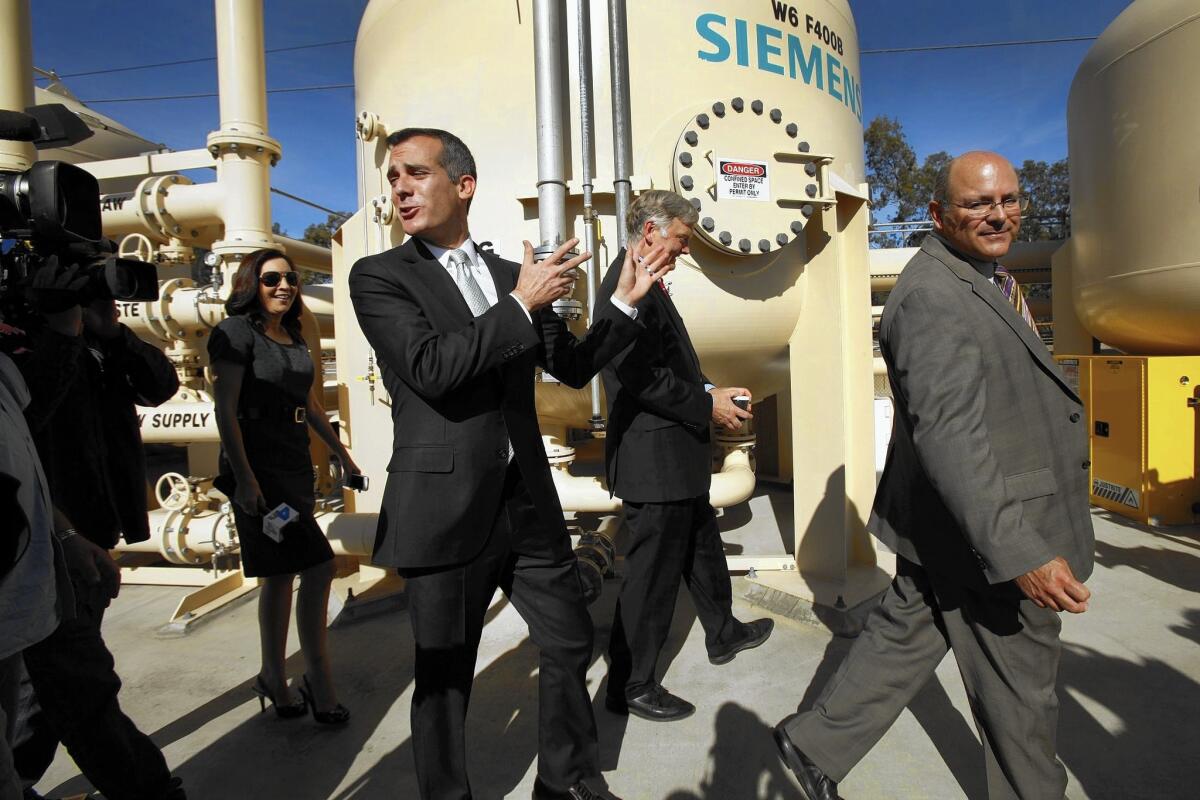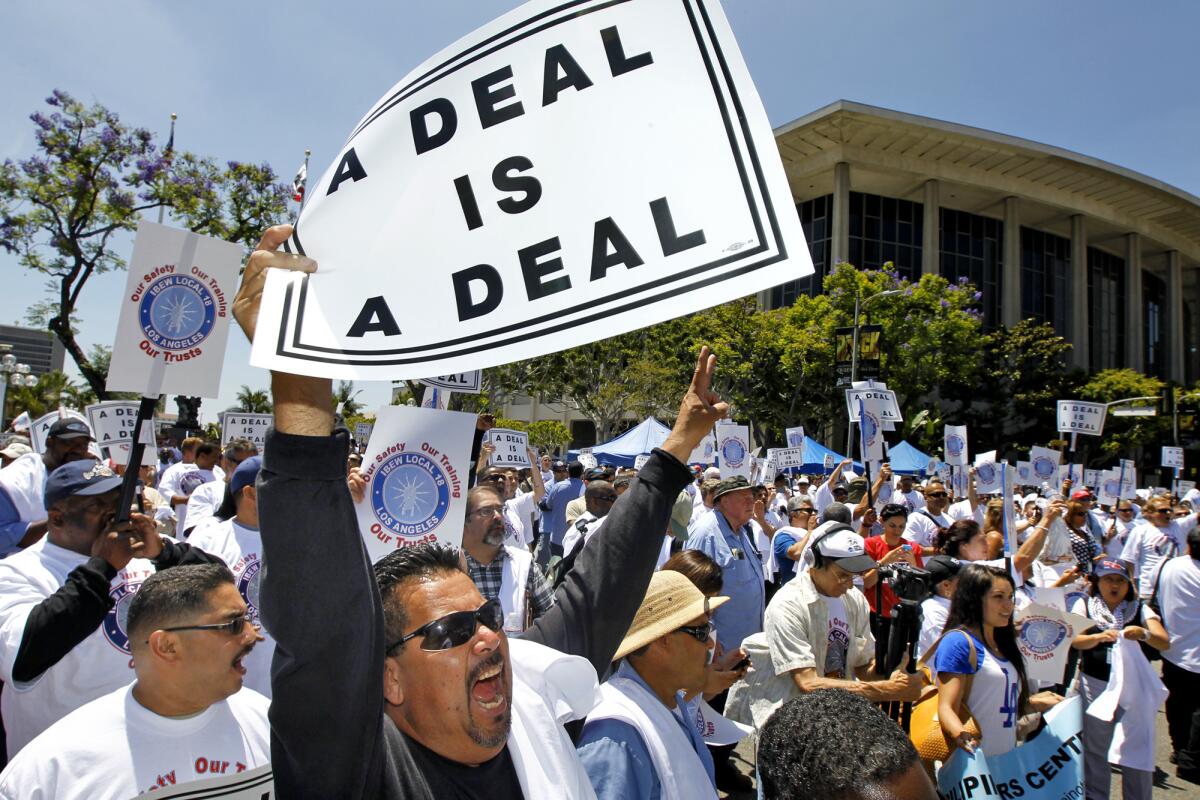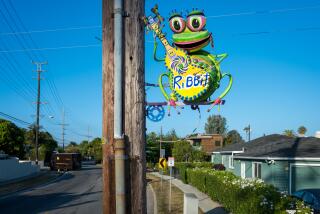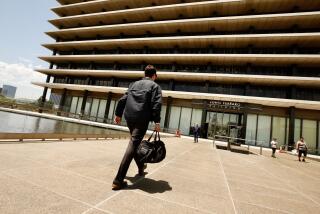Column: How one union boss manages to outfox L.A. politicians — and deliver the goods to his members
Brian D’Arcy once told me his drink of choice was a pint of Guinness, and it tasted all the better with a shot of Jameson to back it up.
He’s also a two-fisted negotiator, and at some point Wednesday, I imagine D’Arcy will be raising both the beer and the whiskey in celebration. The baddest union boss in Los Angeles is a solid bet to win another generous contract for roughly 9,000 members of the International Brotherhood of Electrical Workers, Local 18.
The L.A. City Council is scheduled to vote on the contract, but that’s just a formality. You can hurry down to council chambers and raise a stink, but this thing is being slipped through without formal public hearings or even an attempt to justify it beforehand, because city officials know they’d get pounded.
How this union keeps getting such a good deal
DWP employees, already handsomely compensated in relation to their utility industry counterparts and to L.A. city employees, will get six raises in five years, with a range of 13% to 22% total, depending on variables.
The union made a couple of modest concessions but members will continue to pay nothing toward healthcare premiums, even as many Americans worry about the rising cost of medical insurance or losing it altogether.
Nada. Zilch. Zeeeee-ro.
When I took on this topic in my Sunday column, a reader wrote to scold me for being so tough on the union.
He wasn’t reading closely.
My issue isn’t with the union, it’s with L.A. Mayor Eric Garcetti and the City Council. When it comes to the DWP, you want your elected leaders to be watchdogs, not lap dogs. Back in 2013, Garcetti played hardball with D’Arcy and held him to a 2% raise over four years, along with pension concessions.
Nice going, ace.
But Garcetti didn’t come through on the healthcare contribution he wanted in 2013. He said he’d make another run at it in 2017, but his knees have buckled again.
Garcetti told me Tuesday afternoon that this contract was based on “accounting and not politics,” and he got a lot of what he was after. He highlighted the gutting of IBEW’s mysterious pet project training institutes, which gobbled up $4 million a year in ratepayer funds. The mayor told me he knew exactly what he could afford and still keep DWP rates low and service improving, and this contract hit his targets “on the head.”

One cheer for Garcetti
Bully for him, but I feel like I was hit on the head, too. The new contract saves $4 million a year from those cockamamie institutes, but will cost ratepayers an additional $56 million a year or so, by the DWP’s own math.
After all the promises about getting employees to contribute to their healthcare costs, all we hear is excuses as to why it didn’t happen.
“Typically it’s hard to get everything you want,” said Councilman Paul Koretz, who told me he intends to vote in favor of the contract Wednesday. “I believe we’ve gotten everything else we wanted except for that piece.”
He also said that with a lot of retirements coming up, DWP salaries have to be remain competitive, so the utility doesn’t lose out on good candidates.
Is it all just a big game?
Here’s what former Councilman Bernard Parks had to say about that:
“Each time the LAPD and LADWP want a raise, they invent a pending personnel exodus based on better wages and benefits elsewhere.”
Parks said “there’s no real desire to confront any union in the city, and particularly at the DWP.” In Garcetti’s many years as city council president, said Parks, he wasn’t particularly known for playing hardball with the DWP’s biggest union.
So how does Brian D’Arcy do it, taking his lumps now and then — he lost big when he backed Wendy Greuel over Garcetti for mayor four years ago — but racking up far more victories than defeats?
“It comes from a relatively weak political structure,” said Jaime Regalado, Cal State L.A. professor emeritus.
A political structure that favors unions
The way we’re set up in Los Angeles, the mayor shares power with the City Council, and when it comes to DWP, the lines of power are further blurred. There’s a mayor-appointed DWP board, and then there’s the unfortunate bloke who gets suckered into being general manager, not knowing you can’t take two steps in any direction without sticking your toe into a live socket.
The GM has to answer to competing interests and foaming customers in a utility with a history of scandal and ineptitude, which is why so many of them get run out of the job or decide on their own to run through the nearest window and leap into the moat outside DWP headquarters.
Since 1992, Los Angeles has had five mayors.
Eight City Council presidents.
Thirteen general managers.
And one IBEW boss.
No wonder D’Arcy runs the show. He’s the lone survivor, he’s saluted by his troops, and he’s got a ton of money to throw around at election time.
“You have this one powerful entity who has survived all the changes at the top, and the troops remain loyal to him,” said Regalado. “Everybody’s afraid of him internally, and everybody’s afraid of him externally. And he’s answerable only to his members.”

David Wright, the current GM, told me last week that DWP gave up on healthcare contributions in this contract because when they sat down to negotiate, D’Arcy insisted it was a non-starter. DWP feared IBEW would strike over that issue, so they moved on.
Hey, this isn’t seventh grade. You don’t give your lunch money to the school bully and then cry that you had no choice.
I don’t begrudge public employees good pay and good healthcare coverage. Middle-income jobs are in short supply, especially in Los Angeles.
But the average DWP salary is about $100,000, and on top of that, the utility pays about $17,600 a year for healthcare.
Private sector workers typically pay about one-third the cost of their healthcare, so it shouldn’t be all that hard to get a mere 10% from DWP and other city employees.
Ten percent of $17,600 is $1,760. That breaks down to a measly $146 a month.
With a 5% contribution, DWP employees would pay just $73 a month, or $36.50 every two-week pay period.
But our fearless leaders couldn’t get a nickel out of them.
Somewhere, Brian D’Arcy has a mug in his hand and a smile on his face.
Get more of Steve Lopez’s work and follow him on Twitter @LATstevelopez
More to Read
Sign up for Essential California
The most important California stories and recommendations in your inbox every morning.
You may occasionally receive promotional content from the Los Angeles Times.











